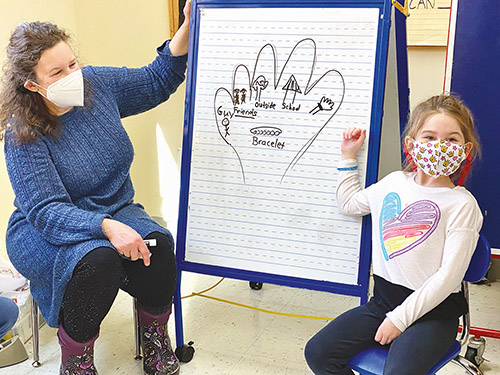


October is ADHD Awareness Month, Learning Disabilities Awareness Month and Selective Mutism Awareness Month. These developmental disorders, along with high-functioning autism, are the ones most frequently seen in our students at The Springboard School. This October focus has led me to reflect on the hundreds of children whom I have been privileged to work with over the past 43 years. Two ideas emerge. The first is the importance of early intervention, which offers help to children when their brains are the most plastic and the possibility of dramatic, long-term change is most likely. The second is the importance of engaging parents in the treatment process, which solidifies and expands their children’s development gains. These two concepts provide the cornerstone of our program.
Let’s look briefly at each of these developmental disorders. Children with ADHD have trouble focusing and attending—skills that are crucial to success in elementary school. Some of these children also have difficulty with self-regulation. Children who cannot sit still in school and who may be disruptive or aggressive cannot be maintained in typical classrooms. Without specialized help, many very intelligent children get lost in school and never reach their full potential.
The Springboard School has created a curriculum to address these issues through direct teaching. Our students are smart. They learn these lessons well, and they use them to move toward more appropriate behaviors. Some may eventually need medication to help them, but a comprehensive behavioral curriculum is an essential first step.
Learning disabilities are traditionally diagnosed in the first or second grade. But teachers working with preschool children with special needs can pick up potential problems earlier and can begin to address them. In our program we work on basic pre-reading skills, like left to right orientation and pattern recognition. We help the children develop narrative skills in their play and we teach them to verbally narrate their personal stories. These skills promote future literacy. We incorporate the written word, numbers, writing and identifying letters in many of our fun, daily activities. In these ways we build a foundation for academic learning that some children don’t pick up their own. If we feel that a child needs the help of a reading or learning specialist, we arrange for this in a timely manner.
We have worked with many children with selective mutism, which is an anxiety disorder that is sometimes genetically based. These children often have trouble regulating their emotions and behaviors. At home they may talk too much and have frequent, uncontrollable outbursts. Outside, they may withhold language altogether and they are often constricted in their affect and even their physical movements.
This disorder has a profound effect on a child’s development and adds a high level of stress to the family. It can be difficult to treat. Our curriculum makes use of a consistent therapeutic approach, and includes the direct teaching of many strategies for lowering anxieties. We have offered individual psychotherapy, and we have always included parents in the treatment plan. Some of these children benefit from medication, too. I am very pleased that all of the children with selective mutism attending our program have recovered.
Our curriculum is comprehensive, focusing on socialization, communication and self-regulation, but addressing many other aspects of our students’ growth and development. I firmly believe, however, that it is our collaboration with the parents that makes each child’s progress so dramatic and so long-lasting. From its inception in 1978, ours has always been a parent/child program. Parents were always welcome to join their child in the classroom, where they could observe their child and the teachers together. Weekly parent counseling and daily chats with staff were included.
Then came the pandemic and for safety reasons, parents weren’t even allowed in the building! How could we maintain our collaboration with the parents? Through Zoom, of course! In this way, they still receive parents’ counseling as well as weekly chats with all of the teachers.
Parents always know their children best and they help us with their knowledge. They let us know about the child’s life at home, and we help them with how to manage best. We provide them with concepts and strategies that they can use with all of their children, and also, with some modifications, for years to come. This kind of collaboration actually creates a powerful, 24-hour-a-day program.
I am full of admiration for the amazing and devoted parents who work so hard on behalf of their children. These October awareness months allow me to remember once again.
Lois Mendelson, PhD, is the director of The Springboard School at Lubavitch on the Palisades, a unique multidisciplinary program that helps bright young children (ages 4-6) with developmental challenges and emotional fragilities reach their full potential and build a foundation to a mainstream environment. Learn more at lpsnj.org/springboard or contact Lois at [email protected] or 917-692-8298.










